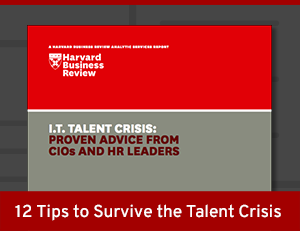Companies all across America are increasingly experiencing a shortage of skilled, entry-level IT talent. As a result, tech executives are having a difficult time hiring, which hinders their ability to expand and develop new technologies. Not only has recruiting become a constant challenge in the IT world, but employee retention has become one as well. It’s simple:
- Employers believe the stable, loyal IT talent they have been looking for does not exist.
- Employers think the talent they do have is quickly stolen out from under them by companies that are willing to pay more.
 And yet, there is one pool of untapped talent employers don’t seem to know about: opportunity youth. Opportunity youth are the 5.5 million young adults, ages 16-24, who are currently out-of-school and out-of-work. These young adults have time and again impressed employers with their commitment to learning, company loyalty, and diversity of skills. And at the same time, most of these young adults never get their foot in the door because they have atypical resumes.
And yet, there is one pool of untapped talent employers don’t seem to know about: opportunity youth. Opportunity youth are the 5.5 million young adults, ages 16-24, who are currently out-of-school and out-of-work. These young adults have time and again impressed employers with their commitment to learning, company loyalty, and diversity of skills. And at the same time, most of these young adults never get their foot in the door because they have atypical resumes.
The good news is that the IT employers who build their talent pipeline from this group of young adults see their IT skills shortage diminish, retention rates rise, and employee diversity increase.
Here are three companies that are both growing the IT field and their bottom lines by building talent pipelines for opportunity youth:
- Marathon Consulting (Marathon) was having a difficult time finding the right talent that could keep up with the company’s fast-paced and demanding work environment. Realizing many of the company’s leaders had taken atypical paths to achieve success, Marathon decided to partner with NPower’s Technology Service Corps — a program that provides participants free technical classes and mentoring to prepare for careers in IT. Brian Kingsley, director of Technical Services at Marathon, stated, “NPower’s Technology Service Corps program gives Marathon access to motivated new employees who all have more certifications, experience, and knowledge on their first day than a lot of other traditional candidates. They are great employees with a high level of dedication and desire to contribute.” Through this partnership with NPower, Marathon gained a direct link to a cost-effective pipeline of skilled and reliable employees unlike any they had come across before.
- Salesforce believes that leveraging technology, people, and resources together can positively impact communities in their area. When Salesforce recognized its recruiting and retention practices were obstructing its growth in the competitive San Francisco market, it decided to partner with Year Up, a one-year professional development program for low-income 18-24-year-olds. Year Up worked with Salesforce to create new internship and post-internship placement opportunities for opportunity youth at Salesforce and other technology companies in search of skilled, entry-level IT talent. Since 2008, Salesforce has hosted over 231 Year Up interns at sites across the country (202 interns in the San Francisco Bay Area) with a conversion rate of 51.85 percent for all interns, proving to be a successful, innovative, non-traditional recruiting strategy. In addition to solving its own problems, Salesforce has helped strengthen communities and empower individuals to become successful through education and career training.
- The HP Foundation recognized the global economic disadvantages people were facing simply because they lacked an education. To assist these people, the foundation launched HP’s Learning Initiative for Entrepreneurs (HP LIFE). HP LIFE is an online training resource that provides small business owners, entrepreneurs, and young adults with essential IT and business skills. Deborah Ledbetter, HP LIFE Partnership Manager, stated that “Through HP LIFE, we are trying to tap into young people and improve IT and business skills to help them start a business or grow a business or just improve their skills for future employment.” By providing free online courses to young adults across the globe, HP is creating a future pipeline of skilled STEM-educated workers. HP’s mission to provide access to a quality education has impacted over 600,000 people from over 200 countries and territories, and 84 percent credit the HP LIFE program with their success.
These are only three companies, out of hundreds, which are finding talent by building talent pipelines for opportunity youth. It is simple: stable, loyal talent does exist. As Marathon, Salesforce and HP have proven, employers will start finding more than qualified applicants once they start looking in the right places.
Learn more about IT talent management in this Harvard Business Review report: "IT Talent Crisis: Proven Advice from CIOs and HR Leaders."






